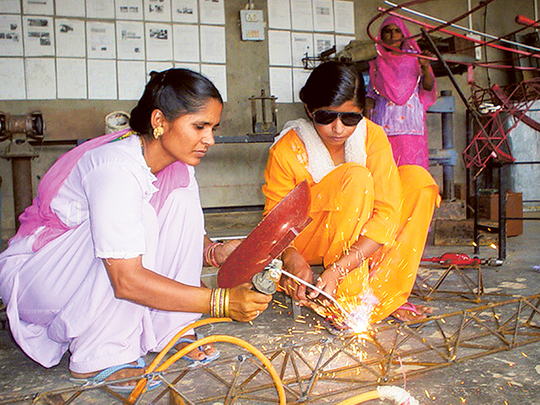
New Delhi: Women in rural India are proving that knowledge is more important than educational degrees. Breaking stereotypes, they are learning skills traditionally restricted to men.
Shahnaz Banu, 38, a resident of Aari, an obscure village in Rajasthan, is a solar technician, skilled in the fabrication and production of parabolic solar cookers. A student at a night school, at the age of 15, she was chosen for her intellect by community social workers from the Barefoot College in Tilonia village near Ajmer, Rajasthan.
An NGO, Barefoot, was started by Bunker Roy, a Doon School alumni, who set out to help villagers in the 1970s. More than four decades later, Barefoot College is a centre of learning with a difference. The biggest asset of this centre is that it has created significant employment opportunities for rural women and enabled them to earn a profit from handicrafts and trained them to be solar engineers.
Shahnaz says: “In our village and Muslim community, women were not allowed outside the house. But when I started attending the night school and studied up to Class 3, I earned the respect of village women.”
Sensing that, Barefoot workers gave Shahnaz the task to educate women about the importance of hygiene. Thereafter, she was trained for the production of solar cookers.
The solar expert says: “Initially, my husband was reluctant to let me work, but on realising that I was adding to the family income, understood the worth of a working wife.”
Word spread around and women were curious to know about solar techniques that Shahnaz had learnt. They too wished to become technicians, and after finishing household chores or grazing cattle during the day, many among them started attending night schools.
Soon after, Shahnaz, who heads the Women Barefoot Solar Cooker Engineers Society that was established in 2003, was put on the job of training them to manufacture and cook on solar cookers.
“It expanded their livelihood options and improved their quality of life. Ever since, together we have helped many illiterate and semi-literate women, who independently fabricate, install and maintain solar cookers,” she claims.
Over the years, the six-months course has enabled women from several countries, including South Africa, Argentina, Brazil, Tanzania and Afghanistan to train and become solar engineers. Such efforts have also brought solar electrification to villages in many countries. Women associated with the solar power project in Tilonia now receive a fixed salary every month.
Explaining the working of a parabolic solar cooker, Shahnaz says: “It uses energy from sunlight to cook food. The sunrays fall on 300 mirrors that in turn, reflect them onto the bottom of a cooking pot and cook food quickly. The cookers are especially very useful in places that receive abundant sunlight.
“The eco-friendly cooking system now helps conserve trees and women do not have to spend long hours searching for firewood. The cooker may not be portable, but is user friendly. Adjusted once in the morning, it allows uninterrupted cooking during the day. Fitted with a spring and clock system, which completes one rotation in over three minutes, the cooker rotates and tracks the sun throughout the day.”
Building a cooker requires high accuracy and skill in metal craftsmanship, which women at Barefoot seem to have in abundance. Each cooker weighing 130kg is built using precise measurements by bending, wielding and cutting in a month’s time. There is no margin for error, as one miscalculation can result in a faulty cooker. But with willpower, these women have mastered the art and empowered themselves. ”












